Plans to muzzle the ear-bashing grunters of women’s tennis have found an unlikely ally in Maria Sharapova.
One of the worst offenders, Sharapova’s screams have been measured at more than 101 decibels — comparable to a chain saw, a pneumatic drill or a speeding train.
The sport’s governing body is to educate players to turn down the volume after pressure from fans, TV broadcasters and a handful of competitors fed up with the constant shrieking on court — and Sharapova thinks it is the right answer.
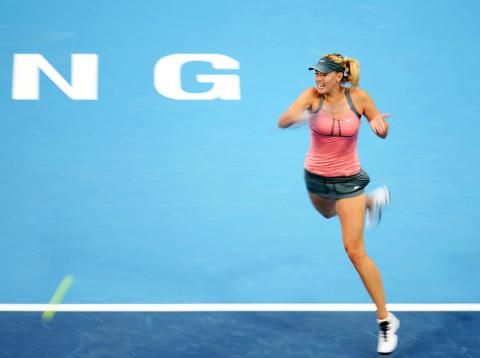
Photo: AFP
The WTA plans to muzzle the next generation with the aid of umpires armed with hand-held devices to measure noise levels on court. Education at major tennis academies, and with juniors and players at lower-tier tournaments has already begun.
“Bottom line is the right answer has been taken by the Tour,” Sharapova said, safe in the knowledge she will not be told to shush.
“I started grunting since whenever I can remember,” she added at the Pan Pacific Open in Tokyo. “I see videos of myself and I’ve grunted for that long. Nobody told me to do it in Russia or in Florida. It’s just a natural habit.”
Grunting made the headlines again this year after Belarussian Victoria Azarenka and Sharapova screeched their way to the first two Grand Slam titles of the year.
“The information going towards coaches and academies that are developing talent from a young age is teaching them a certain breathing technique because when you start something from a young age and continue it, it’s a habit — whether you do grunt or don’t grunt,” Sharapova said. “The WTA created a plan. That’s the smart way to go about it, rather than like taking someone’s forehand and grip in the middle of their career, and telling them to change it.”
However, nine-time Wimbledon singles champion Martina Navratilova calls grunting “cheating, pure and simple” and wants rule changes sooner rather than later.
Tennis coach Nick Bollettieri, who has trained many of the game’s super-grunters, including Sharapova, has been accused of teaching it as a ploy to distract opponents.
Bollettieri denies the accusation, but Caroline Wozniacki’s complaints about grunting last year prompted the WTA to approach his academy to discuss ways of preventing the next generation from developing the habit.
Fans in Tokyo last week were divided on the subject of grunting.
“I like it when Sharapova screams,” 27-year-old dental assistant Saeko Hasebe said. “It’s part of the fun. They shouldn’t ban it.”
Businessman Makoto Taniguchi disagreed.
“It’s too noisy,” the 38-year-old said after an Azarenka ear-bashing. “I’ve only been here for two hours and I’ve got a splitting headache.”
Pan Pacific Open winner Nadia Petrova rejected claims grunting was a deliberate tactic and predicted that it would take a long time for the WTA to change the rules.
“I think the main reason is some coaches say the larger you grunt the more air you let out of your lungs to actually execute the stroke harder, so you can hit harder,” the Russian said. “I guess that’s why. That’s the only explanation I have. I don’t think they even realize how loud they get.”
Studies back up Petrova’s theory that the squealers are not faking, claiming that yelling can give people an energy boost or increase adrenalin.
“Maybe [the WTA need to] work out why it’s happening,” former US Open champion Samantha Stosur said. “Almost everyone grunts. Is it exertion or is it something else?”
Critics are accused of sexism, given grunting is hardly restricted to the women.
Eight-time Grand Slam winner Jimmy Connors grunted furiously in the 1970s and 1980s, while Ivan Lendl once complained that Agassi’s grunting put him off.
“Maybe it’s just not as high-pitched, so you kind of don’t worry about it,” Stosur said.
British No. 2 Heather Watson claimed not to have noticed Sharapova’s cacophony during a three-hour marathon with the Russian last week.
“I think I’m just too used to it,” said Watson, who trains at the Bollettieri academy and works with Sharapova’s former coach Mauricio Hadad. “I know some players don’t like it, but most girls grunt, so I really don’t take much notice.”
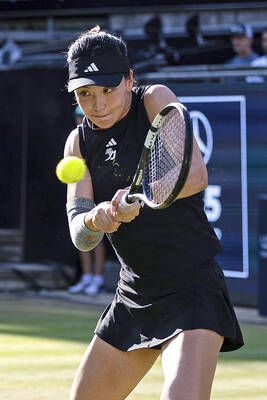
Twelve days after winning her second Grand Slam title at the French Open, Coco Gauff fell at the first hurdle on grass in Berlin on Thursday as beaten Paris finalist Aryna Sabalenka advanced to the quarter-finals. Recipient of a first round bye, American Gauff lost 6-3, 6-3 to Chinese qualifier Wang Xinyu as world number one Sabalenka beat Rebeka Masarova 6-2, 7-6 (8/6) in her second round tie. Winner of 10 main tour titles, including the US Open in 2023 and the WTA Finals last year, Gauff has yet to lift a trophy in a grass-court tournament. “After I won the first
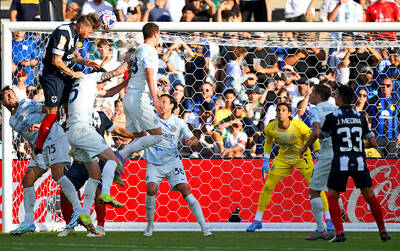
Sergio Ramos on Tuesday outfoxed two Inter players and artfully headed home the first goal for Monterrey at the FIFA Club World Cup. The 39-year-old Ramos slipped through the penalty area for the score just as he did for so many years in the shirts of Real Madrid and Spain’s national team, with whom he combined smarts, timing and physicality. Ramos’ clever goal and his overall defensive play at the Rose Bowl were major factors in Monterrey’s impressive 1-1 draw against the UEFA Champions League finalists in the clubs’ first match of the tournament. “There is always a joy to contribute to the
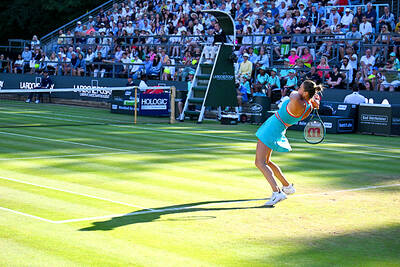
Top-ranked Aryna Sabalenka staged a “crazy comeback,” saving four match points before beating Elena Rybakina 7-6 (6), 3-6, 7-6 (6) in the quarter-finals of the Berlin Open on Friday. Sabalenka was 6-2 down in the final-set tie-breaker, but won six straight points to reach her eighth semi-final of the season. “Elena is a great player and we’ve had a lot of tough battles,” Sabalenka said. “I have no idea how I was able to win those last points. I think I just got lucky.” “I remember a long time ago when I was just starting, I won a lot of matches being down
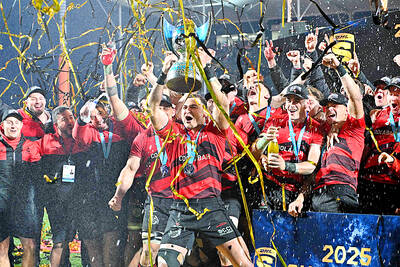
The Canterbury Crusaders edged the Waikato Chiefs 16-12 in an intense Super Rugby Pacific final battle in Christchurch yesterday to claim their 15th title in 30 years of the Southern Hemisphere competition. Hooker Codie Taylor scored a try and Rivez Reihana contributed 11 points from the kicking tee as the most dominant team in Super Rugby history extended their perfect home playoff record to 32 successive matches since 1998. The Chiefs, who were looking for a first title since 2013, scored first-half tries through George Dyer and Shaun Stevenson, but were unable to register a point after the break and fell to